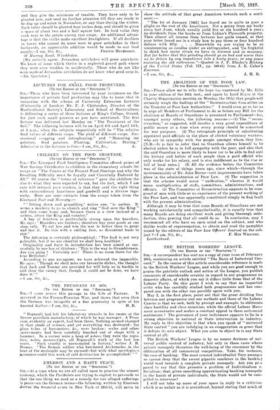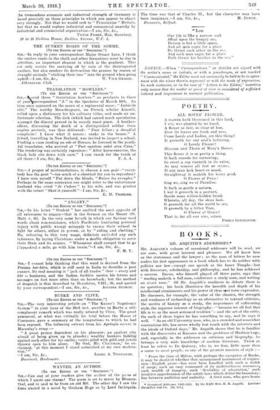THE BRITISH WORKERS' LEAGUE. [To THE EDITOR OF THE "
SPECTATOR."]
SIL—A correspondent has sent me a copy of your issue of February 16th, containing an article entitled " The Basis of Industrial Con- cord." In the course of this article considerable reference is made to the British Workers' League, and while you are good enough to praise the patriotic outlook and action of the League, you publish comments of considerable severity in regard to our programme on domestic affairs, of which you say it differs little from that of the Labour Party. On this point I wish to say that no impartial critic who has carefully studied both programmes and has com- pared one with the other can possibly agree with you.
May I, in the first place, point out that the great dividing line between our programme and our methods and those of the Labour Caucus is that we seek, both by precept and example, to obliterate class hostility and class suspicion, while the official Labour Move- ment accentuates and makes a constant appeal to these anti-social sentiments ? The gravamen of your indictment appears to lie in a strong objection to national or State intervention in industry. My reply to this objection is that when you speak of "universal State control " you are indulging in an exaggeration so gross that it defeats its own object. What you seem to object to is any State control at all. .
The British Workers' League is by no means desirous of uni- versal public control of industry, but only in those cases where private monopoly threatens the well-being of the consumer by the obliteration of all commercial competition. Take, for instance, the case of banking. The most crusted individualist Tory amongst us cannot deny that the recent gigantic combines in the bankinJ world tend towards a complete private monopoly. Are you pared to say that this presents a problem of Individualism r. Socialism; that, given something approximating banking monopoly in the hands of private individuals, the State would not be com- pelled to intervene?
I will not take up more of your space in reply to a criticism which is as unfair as it is prejudiced, beyond stating that much of he tremendous economic and industrial strength of Germany is based precisely on those principles to which you appear to object very strongly. Not that we would seek to " Prussianize" Britain, but that we would replace industrial and commercial anarchy by industrial and commercial organization.—I am, Sir, &c., Vicroa FISHER, Hon. Secretary.
28 to 36 Sicilian House, Sicilian Avenue, W.C. 1.



























 Previous page
Previous page